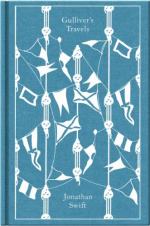They look upon fraud as a greater crime than theft, and therefore seldom fail to punish it with death; for they allege, that care and vigilance, with a very common understanding, may preserve a man’s goods from thieves, but honesty has no fence against superior cunning; and, since it is necessary that there should be a perpetual intercourse of buying and selling, and dealing upon credit, where fraud is permitted and connived at, or hath no law to punish it, the honest dealer is always undone, and the knave gets the advantage. I remember, when I was once interceding with the king for a criminal, who had wronged his master of a great sum of money, which he had received by order, and run away with, and happening to tell his majesty, by way of extenuation, that it was only a breach of trust, the emperor thought it monstrous in me, to offer as a defence the greatest aggravation of the crime; and, truly, I had little to say in return, farther than the common answer, that different nations had different customs; for, I confess, I was heartily ashamed.
Although we usually call reward and punishment the two hinges upon which all government turns, yet I could never observe this maxim to be put in practice by any nation except that of Lilliput. Whoever can there bring sufficient proof that he hath strictly observed the laws of his country for seventy-three moons, hath a claim to certain privileges, according to his quality and condition of life, with a proportionable sum of out of a fund appropriated for that use; he likewise acquires the title of snillpall, or legal, which is added to his name, but doth not descend to his posterity. And these people thought it a prodigious defect of policy among us, when I told them that our laws were enforced only by penalties, without any mention of reward. It is upon this account that the image of Justice, in their courts of judicature, is formed with six eyes, two before, as many behind, and on each side one, to signify circumspection, with a bag of gold open in her right hand, and a sword sheath in her left, to show she was more disposed to reward than to punish.
In choosing persons for all employments, they have more regard to good morals than to great abilities; for, since government is necessary to mankind, they believe that the common size of human understanding is fitted to some station or other, and that Providence never intended to make the management of public affairs a mystery, to be comprehended only by a few persons of sublime genius, of which there seldom are three born in an age; but they suppose truth, justice, temperance, and the like, to be in every man’s power, the practice of which virtues, assisted by experience, and a good intention, would qualify any man for the service of his country, except where a course of study is required. But they thought the want of moral virtues was so far from being supplied by superior endowments of the mind, that employments could never be put into such dangerous hands as those of persons so qualified; and at least, that the mistakes committed by ignorance, in a virtuous disposition, would never be of such fatal consequences to the public weal as the practices of a man whose inclinations led him to be corrupt, and who had great abilities to manage, to multiply, and defend his corruptions.




